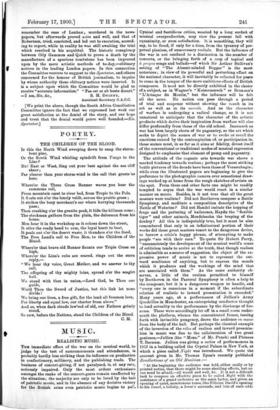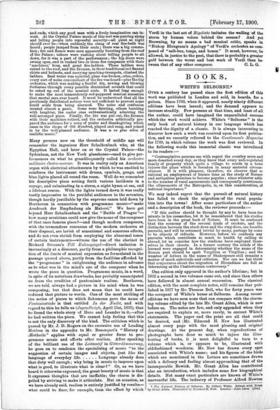M USI C.
REALISTIC MUSIC.
TIM immediate effect of the war on the musical world, to judge by the test of announcements and attendances, is probably hardly less striking than its influence on production in confectionery, millinery, and the publishing trade. The business of concert-giving, if not paralysed, is, at any rate, seriously impaired. Only the most ardent enthusiasts amongst the ranks of the concert-goers remain unaffected by the situation; the majority are only to be lured by the bait of patriotic music, and in the absence of any decisive victory for the British arms even patriotic music begins to pall.
Cynical and fastidious critics, wearied by a long surfeit of musical overproduction, may view the present lull with equanimity, or even satisfaction. It is something, they will say, to be freed, if only for a time, from the tyranny of per- petual pianism, of unnecessary recitals. But the influence of
the war is not confined to a diminution in the number of concerts, or the bringing forth of a crop of topical and a propos songs and ballads—of which Sir Arthur Sullivan's setting of " The Absent-minded Beggar " is the most
notorious ; in view of its powerful and perturbing effect on the national character, it will inevitably be reflected for years to come in the temper of the more ambitious efforts of British composers. It need not be directly exhibited in the choice of a subject, as in Wagner's " Kaisermarech " or Bruneau's " L'Attaque du Moulin," but the influence will be felt all the same. No nation can pass through a period of trial and suspense without showing the result in its art as well as in its morale. And as the character of warfare is undergoing a radical change, so it is not unnatural to anticipate that the character of the artistic products which derive their inspiration from warfare will also differ profoundly from those of the old school. Inasmuch as war has been largely shorn of its pageantry, so the art which seeks to depict the scenes of war or to evoke or recall the emotions caused by the contemplation of, or participation in, those scenes must, in so far as it aims at fidelity, divest itself of the conventional or traditional modes of musical expression designed to emphasise that element of pomp and pageantry.
The attitude of the cognate arts towards war shows a marked tendency towards realism; perhaps the most striking battle pictures of the decade have been those of Verestchagin; while even the illustrated papers are beginning to give the preference to the photographic camera over sensational draw- ings worked up at home from the rough sketches of artists on the spot. From these and other facts one might be readily tempted to argue that the war would react in a similar manner on music. Besides, is it not true that all the great masters were realists ? Did not Beethoven compose a Battle Symphony, and meditate a composition descriptive of the Battle of Waterloo ? Did not Handel imitate the hopping of frogs and the pattering of hailstones, Haydn the "flexible tiger" and other animals, Mendelssohn the braying of the donkey ? All this is indisputably true, but it must be also remembered that only in an infinitesimal portion of their works did these great masters resort to the dangerous device, to borrow a critic's happy phrase, of attempting to make people "see with their ears." To quote Sir Hubert Parry, " unconsciously the development of the musical world's sense of criticism tends to arrive at the truth, that though realism is admissible as a source of suggestion, the object of the ex- pressive power of music is not to represent the out-. ward semblance of anything, but to express the moods which it produces and the workings of the mind that are associated with them." As the same authority ob- serves, a little of the realism permitted to himself by Beethoven in the Pastoral Symphony is often a help to the composer, but it is a dangerous weapon to handle, and " every one is conscious in a moment if the subordinate relation of realistic to inward presentation is exceeded."
Many years ago, at a performance of Jullien's Army Quadrilles in Manchester, an enterprising conductor thought to lend actuality to the performance by the discharge of fire- arms. These were accordingly let off in a small room under- neath the platform, whence the concentrated fumes, issuing forth with invincible pungency, drove the audience en masse from the body of the hall. But perhaps the classical example of the inversion of the roles of realism and inward presenta- tion in music was due to the collaboration of two great geniuses,—Jullien (the " Mons." of Mr. Punch) and Phineas T. Barnum. Jullien was giving a series of performances in 1853 in a building called the Crystal Palace in New York, at which a piece called Night was introduced. We quote the
account given in Mr. Thomas Ryan's recently published Recollections of an Old Musician :— " At the beginning the audience was told, either orally or by printed notice, that there might be some startling effects, but no one need be afraid,—all would end well, he. It is not a difficult task to compose an effective piece to be called Night with the assistance of a grand orchestra as the main factor, and given an opening of quiet, monotonous tones, like Felicien David's opening to his Desert, a lullaby, a lover's serenade, and lots of such odds and ends, which any good man with a lively imagination can in- vent. At the Crystal Palace music of this sort was purring along and lulling people into reposeful security—all quiet as night should ever be—when suddenly the clang of real fire-bells was heard ; people jumped from their seats ; there was a big commo- tion ; fire and flames were seen apparently bursting from the roof of the Palace; ushers were rushing about telling people to sit down, for it was a part of the performance ; the big doors were swung open, and in rushed two or three fire companies with their machines,' hose, and great fire-ladders. These ladders were raised to the roof, and the firemen, in their traditional red flannel shirts and helmets, and carrying speaking-trumpets, climbed the ladders. Real water was squirted, glass was broken, cries, orders, every sort of noise concomitant of the fire was heard—plus the big orchestra, which was making a fearful din, sawing and blowing fortissimo through every possible diminished seventh that could be raked up out of the musical scale. It lasted long enough to make the most tremendously red-peppered musical sensation that mortal ears ever heard. It must be understood that all the previously distributed notices were not sufficient to prevent some timid souls from being alarmed. The noise and confusion created almost a panic. Some were fainting, others bursting with laughter, the cooler ones enthusiastically admiring the well-arranged piece. Finally, the fire was put out, the firemen with their machines retired, and the orchestra artistically pre- pared the audience for a song of praise and thanksgiving which came in the shape of Old Hundred, played and sung, and joined in by the well-pleased audience. It was a ne plus ultra of realistic music."
Many persons now on the threshold of middle age will remember the ingenious Herr Schalkenbach who, at the Egyptian Hall, and later on at the Crystal Palace—the Sydenham, not the New York glasshouse—used to give per- formances on what he grandiloquently called his orchestre militaire electro-moteur. It was in reality only an American organ with electrical attachments by which he was enabled to reinforce the instrument with drums, cymbals, gongs, and
blue lights placed all round the room. Well do we remember his descriptive piece setting forth various incidents in a
voyage, and culminating in a storm, a night hymn at sea, and a lifeboat rescue. With the lights turned down it was really vastly impressive to the youthful audiences in the seventies, though hardly justifiable by the supreme canon laid down by Beethoven in connection with programme music—"mehr Ausdruck der Empfindnng ale Malerei." We have got beyond Herr Schalkenbach and the "Battle of Prague "— how many musicians could now give the name of the composer of that once famous piece?—and though modern composers,
with the tremendous resources of the modern orchestra at their disposal, are lavish of sensational and sonorous effects, and do not even shrink from employing the abnormal tones
of certain instruments—witness the use of the clarinet in Richard Strauss's Till Eulenspiegel—direct imitation is increasingly at a discount, partly from a philosophic recogni- tion of the limits of musical expression as formulated in the passage quoted above, partly from the facilities afforded by the "programme " in enlightening the audience in advance
as to what was in the mind's eye of the composer when he wrote the piece in question. Programme music, in a word, in spite of its notorious drawbacks, has probably emancipated us from the crudities of pantomimic realism. Beethoven, we are told, always bad a picture in his mind when he was composing, but that does not mean that he could have reduced that picture to words. One of the most striking of the series of pieces to which Schumann gave the name of
Fantasiesticke is that entitled In der Hacht, and with regard to this he tells us (Jugendbriefe, April 21st, 1838), that he found the whole story of Hero and Leander in it,—after he had written the piece. We cannot help feeling that this is not the only discovery of the kind. The criticism which is passed by Mr. J. D. Rogers on the excessive use of Leading Motives in the appendix to Mr. Bosanquet's " History of esthetic" applies with equal or greater force to pro- gramme music and efforts after realism. After speaking of the brilliant use of the Leitmotif in Gotterdaminerung, he goes on to condemn the specialising of music "to the suggestion of certain images and objects, just like the language of everyday life Language already does that duty well enough ; why bring in music to improve upon what is good, to illustrate what is clear ? " Or, as we have heard it otherwise expressed, the great beauty of music is that it expresses thoughts that are ineffable; the charm is dis- pelled by striving to make it articulate. But on occasion, as we have already said, realism is entirely justified by results— what could be finer, for example, than the effect by which Verdi in the last act of Rigoletto imitates the wailing of the storm by human voices behind the scenes P And yet Browning, by no means a bad musical critic, speaks in "Bishop Blougram's Apology" of Verdi's orchestra as com. posed of "salt-box, tongs, and bones." It must, however, be allowed, in justice to the poet, that there is probably a greater gulf between the worst and best work of Verdi than be-
tween that of any other composer. C. L. G.







































 Previous page
Previous page